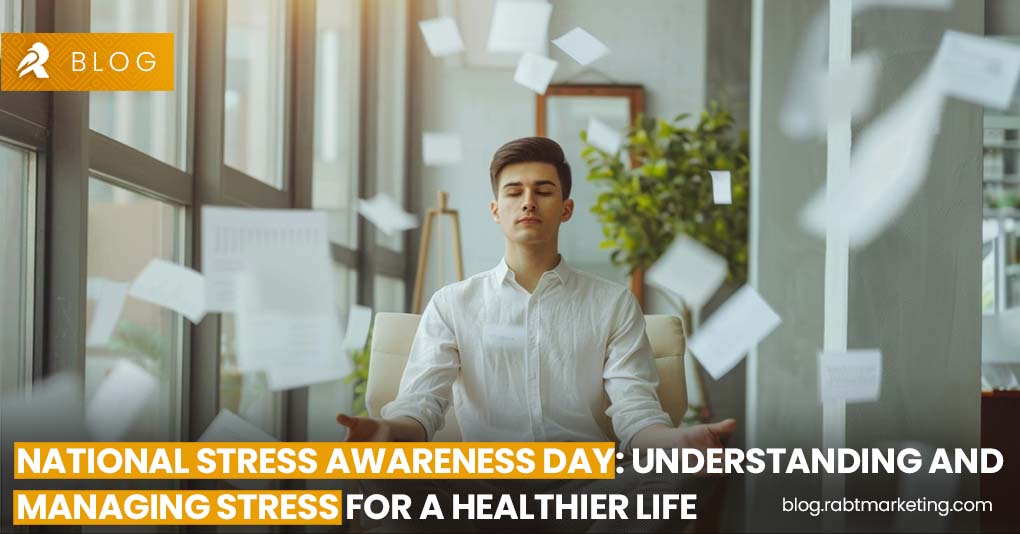Stress is something we all encounter in one form or another, whether due to work, personal life, or unexpected events. National Stress Awareness Day, observed on the first Wednesday in November, is a reminder to pause, reflect, and take steps toward managing the stress in our lives. Let’s explore the purpose of this day, the impacts of stress, and practical ways to reduce its effects.
National Stress Awareness Day reminds us all to acknowledge the stressors in our lives and adopt practical steps to manage them. Whether it’s the fast pace of work or the pressures of daily life, stress affects everyone, and understanding how to handle it is essential to leading a healthier life.
While stress has its biological purpose—helping us react to dangers—modern life has introduced an array of challenges that trigger this response, even when there’s no immediate risk. High-pressure jobs, personal struggles, and constant worries can all lead to prolonged stress, which takes a toll on physical and mental health. Research even shows that work-related stress alone leads to tens of thousands of deaths in the U.S. every year. National Stress Awareness Day was established to help raise awareness about stress and promote good strategies to handle it.

Brief History of National Stress Awareness Day
Founded in 1998 by the International Stress Management Association (ISMA), National Stress Awareness Day was designed to highlight the impact of stress on personal and professional life and share effective strategies for managing it. ISMA has focused on reducing workplace stress by guiding employers and employees in creating supportive environments. The association provides resources for companies and individuals alike to foster health and wellbeing every day.
Over the years, stress management concepts have evolved, with early studies like Hans Selye’s exploration of stress response and the “Executive Monkey Study,” which highlighted the mental toll of stress. These studies laid the groundwork for our understanding of stress as we know it today. The importance of managing stress has only grown, leading to the establishment of National Stress Awareness Day and International Stress Awareness Week.
Meaningful Ways to Observe National Stress Awareness Day
- Attend Stress Awareness Events
Participating in events can be a powerful way to gain insights on managing stress. ISMA hosts an annual Global Stress & Wellbeing Summit, offering a space for discussions on mental health, workplace stress, and wellness. These events are held online and provide attendees with resources and support to navigate stress in today’s world. - Increase Personal Awareness
Recognizing your stressors is the first step to managing them. Left unaddressed, stress can lead to serious health issues, from heart problems to a weakened immune system. Taking a closer look at your life and breaking down stressors—whether from work, relationships, or other areas—can help you identify where to focus your stress-reduction efforts. - Engage in Stress-Relief Activities
Stress can’t be eliminated, but it can be controlled with the right habits. Here are some effective practices:
- Deep Breathing: Calming your mind with a few minutes of deep breathing can help regain focus and release tension.
- Exercise: Physical activity like running, yoga, or even a brisk walk helps relieve stress and releases mood-boosting endorphins.
- Limit Caffeine Intake: Too much caffeine can add to anxiety. Reducing your intake can help stabilize your mood and lessen stress levels.
- Journaling or Talking It Out: Sharing your concerns with a friend or writing them down can offer relief and clarify your thoughts.
- Take a Step Towards a Stress-Free Life
On this day, commit to evaluating and reducing stressors in your life. Start by identifying what contributes to stress and take proactive steps to reduce their impact. Organizations like ISMA offer resources to guide individuals in handling stress in practical and sustainable ways. - Allow Yourself a Day of Rest
If possible, take a day off and let go of daily worries. Allow yourself to unwind, enjoy some leisure time, and focus on activities that refresh you. Giving yourself permission to rest can improve both your mental and physical wellbeing.
Table: Facts and Insights on Stress Management
| Fact | Source/Research | Insight | Suggested Action |
| 75% to 90% of doctor visits are due to stress-related issues. | American Institute of Stress | Chronic stress contributes to a wide range of health issues, from heart disease to insomnia. | Consider incorporating stress management techniques, such as meditation or exercise. |
| Exercise can reduce stress by up to 50%. | Harvard Health Publishing | Physical activity releases endorphins, which improve mood and lower stress levels. | Engage in regular physical activities like walking, running, or yoga. |
| Stress affects productivity at work, with 60% reporting that it impacts their performance. | American Psychological Association | Stress in the workplace not only affects mental health but also reduces efficiency and focus. | Take periodic breaks, practice time management, and communicate stressors with colleagues or supervisors. |
| Mindfulness meditation can reduce stress by 33% after 8 weeks. | National Center for Complementary and Integrative Health (NCCIH) | Mindfulness can help break the cycle of stress by promoting relaxation and focus on the present. | Practice mindfulness exercises, such as deep breathing and guided meditation. |
Mind- Blowing Quotes on Stress Management
- “The greatest weapon against stress is our ability to choose one thought over another.” – William James
- “You can’t always control what goes on outside, but you can always control what goes on inside.” – Wayne Dyer
- “In times of stress, the best thing we can do for each other is to listen with our ears and our hearts.” – Fred Rogers
Read more interesting blogs, click here
Few Final Words
National Stress Awareness Day is a reminder to prioritize self-care and to find effective ways to manage stress. Small improvements and adopting tiny habits can reduce the burden of stress and maximize our quality of life.
Breathe deep, relax your soul
Let stress go, make yourself whole
Unwind, calm your troubled mind
Leave worries behind, peace find
Take control, tame the stress tide
Find your calm, let peace reside
Mindful moments, breathe and be
Free from stress, wild and carefree

